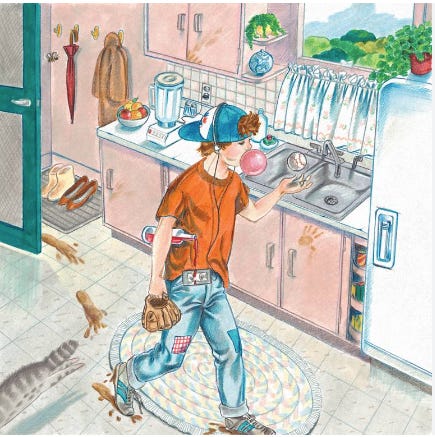"Love you Forever" Tearing down the Culture
Oedipal themes, the glorification of disorder, and the romantic imagination
One of the most disturbing children’s stories ever published is Love you Forever by Robert Munsch and illustrated by Sheila McGraw.
I hit a nerve for some with my critique of Where the Wild Things Are, a book that I hesitated to examine too closely since I, too, had warm childhood memories of reading it. But rebuilding the culture means taking a careful look at what is producing this culture and not taking lightly these artifacts that laugh off the pillars of civilization.
Once you see what they’re teaching your children with these books, you’ll be quick to cast them into the fire. I’m going to make the case for doing just that with Love you Forever.
Aside from the strange Oedipal message that runs throughout this book (notice the conspicuous absence of the mother’s husband and then of the son’s wife, to say nothing of the bizarre adult rocking-habit), there is a persistent message throughout that children are just born wild and free and there’s nothing we hapless adults can do about it.
The first page, which serves as the cover image, sets the tone. The little boy “pulled all the books off the shelves. He pulled all the food out of the refrigerator and he took his mother’s watch and flushed it down the toilet. Sometimes his mother would say, ‘This kid is driving me CRAZY!’”
We’re supposed to laugh at how naughty the child is and how exasperated his mother is. Perhaps if this book represented an aberration from the culture and were telling an unusual but redemptive tale, it might be interesting. But this is the sad state of modern parenting. Undisciplined children and frustrated parents. Although we all have experienced these episodes in child-rearing, it should not be celebrated and made to seem as if it were just the inevitable but hilarious norm. That is disordered, and in essence, normalizing disorder seems to be one of the main themes of this book.
The adolescent years are perfectly in keeping with the conduct of the toddler. What else could be expected of the child whose naughty antics are not corrected but met simply with exasperation and sarcasm?
An anarchic freedom seems to characterize the boy’s adolescent years:
Notice that he has not matured out of the toddler grip, as that bottle of soda spills as he struts across the kitchen with muddy shoes. This is the behavior you’d expect from your three year-old, not your thirteen year-old. His development has been arrested.
Keep reading with a 7-day free trial
Subscribe to The Christian Imagination to keep reading this post and get 7 days of free access to the full post archives.





